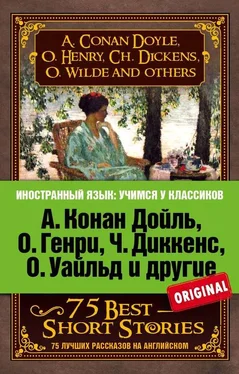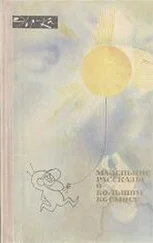Hark! it had swayed till the clapper had touched the bell. The sound was but a tiny one, but the bell was only beginning to sway, and it would increase.
At the sound the Judge, who had been keeping his eyes fixed on Malcolmson, looked up, and a scowl of diabolical anger overspread his face. His eyes fairly glowed like hot coals, and he stamped his foot with a sound that seemed to make the house shake. A dreadful peal of thunder broke overhead as he raised the rope again, whilst the rats kept running up and down the rope as though working against time. This time, instead of throwing it, he drew close to his victim, and held open the noose as he approached. As he came closer there seemed something paralyzing in his very presence, and Malcolmson stood rigid as a corpse. He felt the Judge’s icy fingers touch his throat as he adjusted the rope. The noose tightened – tightened. Then the Judge, taking the rigid form of the student in his arms, carried him over and placed him standing in the oak chair, and stepping up beside him, put his hand up and caught the end of the swaying rope of the alarm-bell. As he raised his hand the rats fled squeaking and disappeared through the hole in the ceiling. Taking the end of the noose which was round Malcolmson’s neck he tied it to the hanging bell-rope, and then descending pulled away the chair.
When the alarm-bell of the Judge’s House began to sound a crowd soon assembled. Lights and torches of various kinds appeared, and soon a silent crowd was hurrying to the spot. They knocked loudly at the door, but there was no reply. Then they burst in the door, and poured into the great dining-room, the doctor at the head.
There at the end of the rope of the great alarm-bell hung the body of the student, and on the face of the Judge in the picture was a malignant smile.
Dracula’s [542]Guest (Bram Stoker)
When we started for our drive the sun was shining brightly on Munich [543], and the air was full of the joyousness of early summer. Just as we were about to depart, Herr Delbruck (the maitre d’hotel [544]of the Quatre Saisons, where I was staying) came down bareheaded to the carriage and, after wishing me a pleasant drive, said to the coachman, still holding his hand on the handle of the carriage door, ‘Remember you are back by nightfall. The sky looks bright but there is a shiver in the north wind that says there may be a sudden storm. But I am sure you will not be late.’ Here he smiled and added, ‘for you know what night it is.’
Johann answered with an emphatic, ‘Ja, mein Herr [545],’ and, touching his hat, drove off quickly. When we had cleared the town, I said, after signalling to him to stop:
‘Tell me, Johann, what is tonight?’
He crossed himself, as he answered laconically: ‘Walpurgis nacht [546].’ Then he took out his watch, a great, old-fashioned German silver thing as big as a turnip and looked at it, with his eyebrows gathered together and a little impatient shrug of his shoulders. I realized that this was his way of respectfully protesting against the unnecessary delay and sank back in the carriage, merely motioning him to proceed. He started off rapidly, as if to make up for lost time. Every now and then the horses seemed to throw up their heads and sniff the air suspiciously. On such occasions I often looked round in alarm. The road was pretty bleak, for we were traversing a sort of high windswept plateau. As we drove, I saw a road that looked but little used and which seemed to dip through a little winding valley. It looked so inviting that, even at the risk of offending him, I called Johann to stop – and when he had pulled up, I told him I would like to drive down that road. He made all sorts of excuses and frequently crossed himself as he spoke. This somewhat piqued my curiosity, so I asked him various questions. He answered fencingly and repeatedly looked at his watch in protest.
Finally I said, ‘Well, Johann, I want to go down this road. I shall not ask you to come unless you like; but tell me why you do not like to go, that is all I ask.’ For answer he seemed to throw himself off the box, so quickly did he reach the ground. Then he stretched out his hands appealingly to me and implored me not to go. There was just enough of English mixed with the German for me to understand the drift of his talk. He seemed always just about to tell me something – the very idea of which evidently frightened him; but each time he pulled himself up saying, ‘Walpurgis nacht!’
I tried to argue with him, but it was difficult to argue with a man when I did not know his language. The advantage certainly rested with him, for although he began to speak in English, of a very crude and broken kind, he always got excited and broke into his native tongue – and every time he did so, he looked at his watch. Then the horses became restless and sniffed the air. At this he grew very pale, and, looking around in a frightened way, he suddenly jumped forward, took them by the bridles, and led them on some twenty feet. I followed and asked why he had done this. For an answer he crossed himself, pointed to the spot we had left, and drew his carriage in the direction of the other road, indicating a cross, and said, first in German, then in English, ‘Buried him – him what killed themselves.’
I remembered the old custom of burying suicides at cross roads: ‘Ah! I see, a suicide. How interesting!’ But for the life of me I could not make out why the horses were frightened.
Whilst we were talking, we heard a sort of sound between a yelp and a bark. It was far away; but the horses got very restless, and it took Johann all his time to quiet them. He was pale and said, ‘It sounds like a wolf – but yet there are no wolves here now.’
‘No?’ I said, questioning him. ‘Isn’t it long since the wolves were so near the city?’
‘Long, long,’ he answered, ‘in the spring and summer; but with the snow the wolves have been here not so long.’
Whilst he was petting the horses and trying to quiet them, dark clouds drifted rapidly across the sky. The sunshine passed away, and a breath of cold wind seemed to drift over us. It was only a breath, however, and more of a warning than a fact, for the sun came out brightly again.
Johann looked under his lifted hand at the horizon and said, ‘The storm of snow, he comes before long time.’ Then he looked at his watch again, and, straightway holding his reins firmly – for the horses were still pawing the ground restlessly and shaking their heads – he climbed to his box as though the time had come for proceeding on our journey.
I felt a little obstinate and did not at once get into the carriage.
‘Tell me,’ I said, ‘about this place where the road leads,’ and I pointed down.
Again he crossed himself and mumbled a prayer before he answered, ‘It is unholy.’
‘What is unholy?’ I enquired.
‘The village.’
‘Then there is a village?’
‘No, no. No one lives there hundreds of years.’
My curiosity was piqued, ‘But you said there was a village.’
‘There was.’
‘Where is it now?’
Whereupon he burst out into a long story in German and English, so mixed up that I could not quite understand exactly what he said. Roughly I gathered that long ago, hundreds of years, men had died there and been buried in their graves; but sounds were heard under the clay, and when the graves were opened, men and women were found rosy with life and their mouths red with blood. And so, in haste to save their lives (aye, and their souls! – and here he crossed himself) those who were left fled away to other places, where the living lived and the dead were dead and not – not something. He was evidently afraid to speak the last words. As he proceeded with his narration, he grew more and more excited. It seemed as if his imagination had got hold of him, and he ended in a perfect paroxysm of fear – white-faced, perspiring, trembling, and looking round him as if expecting that some dreadful presence would manifest itself there in the bright sunshine on the open plain.
Читать дальше
Конец ознакомительного отрывка
Купить книгу












